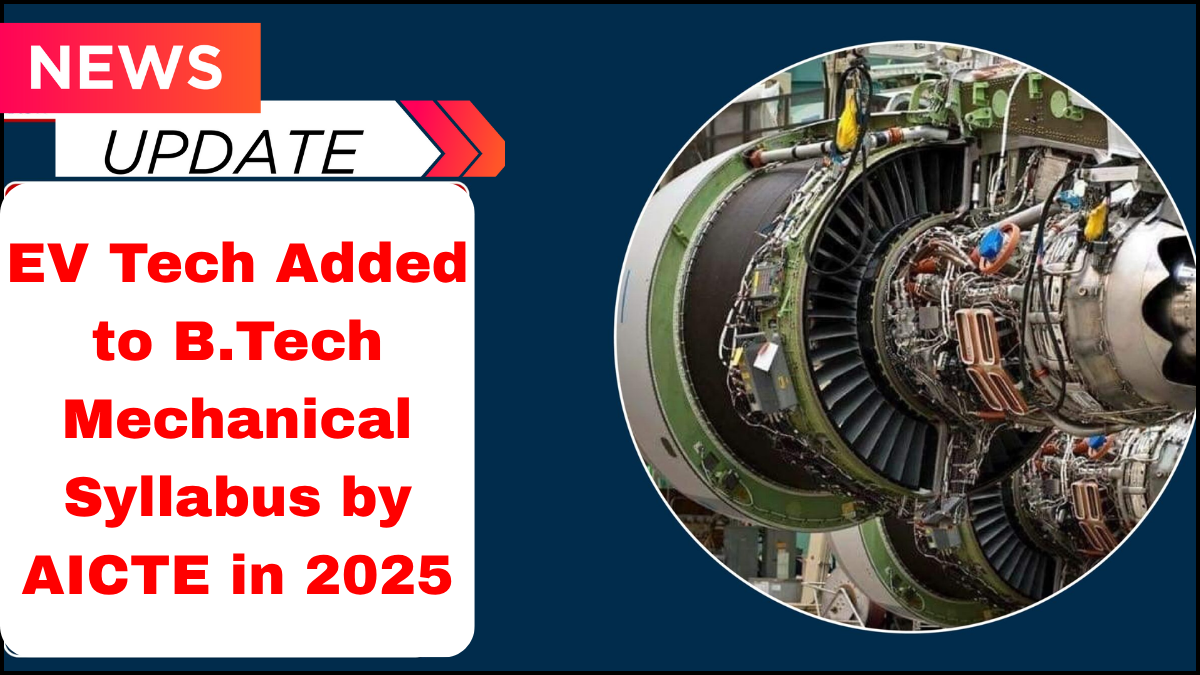In a major shift toward aligning engineering education with industry needs, the All India Council for Technical Education (AICTE) has officially integrated EV technology into the B.Tech Mechanical Engineering syllabus from the academic year 2025 onwards. This progressive step comes at a time when the electric vehicle (EV) sector is rapidly gaining momentum both globally and in India. With this move, AICTE aims to prepare graduates for emerging roles in green mobility and clean energy technology.

Why the Change Matters
The automotive industry is undergoing a paradigm shift. With rising environmental concerns, tighter emission norms, and government incentives, the EV market in India is poised for exponential growth. According to NITI Aayog, India aims to achieve 30% EV penetration by 2030. This requires a workforce that’s not only aware of traditional automotive principles but also trained in electric propulsion systems, battery management, power electronics, and smart vehicle design.
Previously, EV-related topics were scattered or available only as electives. By embedding EV technology syllabus AICTE into the core B.Tech course curriculum India, the council is addressing a long-standing gap between academia and industry demands.
Key Topics Added to the Curriculum
The updated B.Tech Mechanical Engineering syllabus now includes a dedicated module on Electric Vehicle Technology, with the following critical topics:
1. Electric Propulsion Systems
Students will learn about electric motors used in EVs—such as BLDC, PMSM, and induction motors—and how they differ from internal combustion systems in terms of torque, efficiency, and control.
2. Battery Technology and Management
This segment dives into lithium-ion battery chemistry, energy density, thermal management, state of charge (SOC) estimation, and battery safety protocols.
3. Power Electronics and Drives
To power EVs efficiently, students must understand how inverters, converters, and motor controllers work. This module covers essential circuits and switching devices used in drive systems.
4. Charging Infrastructure and Standards
This topic focuses on various types of charging—AC Level 1, Level 2, and DC fast charging—along with Indian and international standards for connectors, grid integration, and public infrastructure.
5. Vehicle Dynamics and Control
From regenerative braking to torque vectoring, students will gain knowledge of dynamic control techniques specific to electric powertrains.
6. EV Design and Simulation
Using CAD and simulation tools, students will be able to virtually model EV systems and analyze factors such as aerodynamics, weight distribution, and thermal flows.
7. Environmental Impact and Policy Framework
A comprehensive look into EV’s role in reducing emissions, policy incentives in India like FAME II, and the life cycle analysis of EV components.
Interdisciplinary Approach and Labs
To ensure a hands-on experience, AICTE also recommends that engineering institutions set up dedicated EV labs equipped with motor testing benches, battery simulators, and real-time monitoring systems. The new syllabus encourages collaboration between mechanical, electrical, and electronics departments, reflecting the interdisciplinary nature of electric vehicle design and manufacturing.
Benefits for Students and Industry
-
Industry-Ready Skills: Students will graduate with competencies directly aligned with job profiles in the EV sector, such as EV design engineer, battery system analyst, or power electronics specialist.
-
Boost to Startups: With technical grounding in EV tech, graduates can venture into startups focused on sustainable mobility, retrofitting kits, or smart charging.
-
Research and Innovation: The inclusion of EV tech will spur more undergraduate research, fostering innovation in areas like lightweight materials, thermal management, and embedded systems.
The Road Ahead
This initiative is part of a broader national effort to make engineering education in India more relevant and responsive. It also supports the government’s long-term vision of becoming a global hub for EV manufacturing and R&D. As EV adoption grows, so will the demand for professionals who can engineer, optimize, and scale this transformation. AICTE’s decision ensures that India’s engineers are not just catching up but leading the way.
Frequently Asked Questions (FAQ)
Q1. What is the significance of AICTE adding EV technology to the B.Tech mechanical syllabus?
A: It aligns the academic curriculum with the evolving needs of the automotive industry, preparing students for careers in electric mobility, battery systems, and green technologies.
Q2. Will this syllabus change apply to all engineering colleges in India?
A: Yes, all institutions affiliated with AICTE will be expected to adopt the revised B.Tech course curriculum in India starting in the 2025 academic session.
Q3. Can students from earlier batches access the new EV modules?
A: Some colleges may offer bridge courses or electives, but the full integration is primarily for batches enrolling from 2025 onwards.
Q4. Are there any internship or project opportunities in the EV sector now?
A: Yes, with this change, AICTE is encouraging colleges to partner with EV manufacturers, battery firms, and R&D labs for internships and capstone projects.
Q5. How will this impact job prospects for mechanical engineers?
A: Positively. Mechanical engineers with EV specialization will be in high demand in sectors like automotive design, clean energy startups, and advanced manufacturing.
click here to learn more